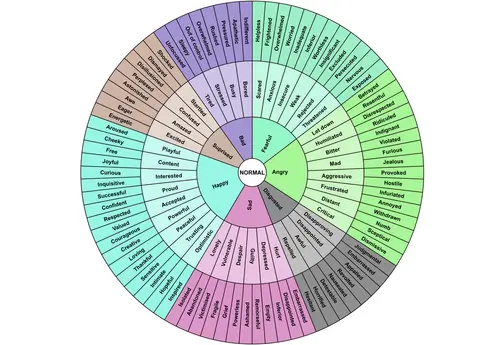The term “feelings” can refer to physical or emotional experiences. The sensation of pain, warmth, or cold describes physical phenomena. Sensations like comfort, fear, and happiness describe what we experience.
Understanding feelings is an essential part of human experience. Why? Because feelings impact how we perceive our entire existence. Our feelings help us identify what is going on inside. They are the body’s way of communicating how we’re experiencing the world.
What Are Feelings?
Feelings allow us to experience an endless array of emotions. They are what gives us the ability to experience the joys and sorrows that life and all its ups and downs brings to us. They also help us to develop and navigate our way through relationships, make important life choices and identify our responses to events.

What Is The Feelings Wheel?
The feelings wheel is a tool that can help people identify and understand their emotions. It’s a circular diagram with different categories of emotions, each divided into smaller subcategories of more specific feelings. By using the feelings wheel, individuals can identify and label the emotions they are experiencing, which can be a helpful first step in managing their emotions.
The benefits of using the feelings wheel are numerous. Firstly, it can help individuals become more aware of their emotional states and the different nuances of their emotions. Secondly, it can aid in improving communication with others by giving individuals the vocabulary to express their emotions more accurately. It can also help people avoid the common pitfall of mislabeling emotions, which can lead to misunderstandings or miscommunication. Additionally, the feelings wheel can be used as a tool in therapy, where individuals can explore and process their emotions in a safe and supportive environment.

Why Feelings Can Cause Trouble
Many of us have been taught from childhood to ignore and suppress our naturally occurring emotions. Oftentimes, we have been taught that the feelings we experience are bad or make us bad. Consequently, we learn to ignore them and even deny they exist. However, what we feel can be powerful, more powerful than most of us realize. One way or another, our feelings will fight to be expressed. They usually win. They get expressed. Sometimes their expression is healthy and sometimes their expression unhealthy, even damaging.
Consequences of suppressed and denied feelings:
- Anxiousness, agitation and sadness
- Problems with anger, aggression and explosive behaviors
- Experiencing phobias and unexplained fears
- Struggles with eating disorders, and addiction
- Difficulty experiencing healthy relationships
- Poor communication and passive aggression
- Developing a long-standing pessimistic perspective on life
- Feelings of low self-esteem, shame, guilt, and low self-worth
To experience emotional and psychological well-being, it is crucial to learn to recognize and embrace your emotions. The next step is to learn how to verbalize effectively in order to avoid the consequences of suppressed and denied feelings.
Remember, we are not our feelings. We do not have to act upon or become what we feel. In other words, just because I might feel angry does not mean I have to act angry. I can learn to safely communicate how I feel without literally becoming my emotions.

Learning to Understand Your Feelings
Our cognitions influence how we feel. This means that the way we see and perceive everyone and everything around us, impacts how we feel. We tend to follow a very simple formula in the precise order of:
- Thinking (our thinking influences how we feel)
- Feeling (what and how we feel impacts our behaviors)
- Behaving (we behave as a result of what we think and feel)
Be sure to pay close attention to how you interpret the events and other people around you. Sometimes a simple adjustment in how someone or something is perceived can set off a whole new chain of responses.
Feelings Vs. Emotions
Feelings and emotions are often mistakenly used interchangeably, but they are not synonyms. Despite sharing some common aspects, there are significant differences between the two. Feelings are experienced consciously, while emotions can manifest consciously or subconsciously.
- Feelings are brought about by emotional experiences and physical sensations, such as pain or hunger. Although not every conscious experience, such as seeing or believing, is a feeling.
- Emotions are different from feelings because they are only felt through the emotional experiences they create. These emotions may be discovered through thoughts, beliefs, desires, and actions. They are stored in the unconscious mind and can be brought to the surface of consciousness through extended psychotherapy if an individual has trouble expressing them.
Feelings are not good or bad.
Feelings are not right or wrong. They just are. Also, feelings need validation. This means they must be acknowledged as real.
Accept and Embrace Your Feelings
Sometimes you will understand their origin and sometimes you will have no clue as to where they came from. It doesn’t matter. Validate all of them. Acknowledge them as yours and allow them to surface in an acceptable way.
Feeling are Physical
You have heard of “butterflies in the stomach”? Our bodies react to how we feel. These manifestations are different for everyone. For example, in times of stress, common reactions include headache, body ache, gastrointestinal issues, and trembling.
It is important to learn to understand your feelings. Doing so is the first step in learning to embrace and accept them as part of who you are. Remember, it’s never helpful to label your feelings as “good” or “bad.” Accept them as part of your experience. Then you can begin to share how you feel. This creates more positive outcomes in your life.
Sharing Feelings
- Put your feelings into words. Talking to a trusted friend, family member or mental health professional allows you to share everything you are carrying inside. Talking to the right person can make you feel less alone. Having a healthy and safe outlet can reduce the power of uncomfortable feelings.
- Learn how to acknowledge and manage anger. Anger is often referred to as a secondary emotion. This means it follows feelings of fear, hurt, or disappointment. Identify and talk about what scares, hurts, or disappoints you. Recognize your body’s signals responding to anger. Then, talk about your feelings before they can turn into action. There are many anger management classes that can teach you how to talk through your anger. In other words, manage your anger before it manages you.
- Express yourself. Journaling and artwork can be effective ways of processing what’s going on inside. Writing down or drawing your what you feel brings them out. Storytelling, art, and writing is a healthy outlet that helps process what might be festering inside of us.
Learning to understand and share allows you to acknowledge and accept your innermost experiences. Also, when you share your feelings, you build longer-lasting healthy relationships. In addition, you improve communication and experience greater well-being.
Keeping your emotions bottled up inside can create lots of negative outcomes. Let yourself feel and share your feelings. You will feel lighter, more authentic, and more connected to others.

Find Help for Managing Your Feelings
If left unchecked, feelings can grow from uncomfortable to unmanageable to downright dangerous. With enough time, anger or grief can become a mental health disorder like depression or anxiety. Uncomfortable feelings can also lead to alcoholism or drug addiction. In such cases, professional help is needed.
Launch Centers knows that mental health treatment should serve the individual. We work with each of our clients, attending to their personal needs. We can treat the symptoms of you or your loved one’s mental health disorder.
What Influences Feelings?
Humans experience a range of emotions throughout life, which can be impacted by various factors. Behavior and culture have a significant influence on emotions. According to a study published in Personality and Social Psychology Review, emotions act as a feedback system, indirectly affecting behavior.
Culture also shapes emotions, as research conducted at Stanford University found that people in different cultures preferred different positive emotions. Traumatic experiences can also have long-term effects on emotions. Trauma can leave an imprint on the brain, causing greater brain activity in areas that process fear and PTSD. Traumatic experiences can lead to various negative emotions like flashbacks, nightmares, and increased fear, anxiety, anger, sadness, and guilt.
Los Angeles Treatment Center
Our program at Launch Centers is designed to help you make sense of your emotional world, and process thought patterns and how it relates to your substance abuse. We want to work with you to develop the skills needed to feel in control of your emotions. Contact us to learn more about our mental health treatment programs for young adults.






